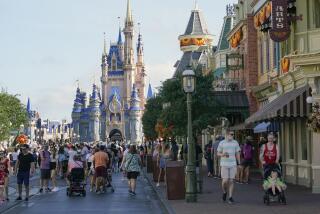Disney looks to parks to cruise through downturn
- Share via
Oil prices are soaring. Home foreclosures are rampant. And many think a recession is at hand. So, where are people heading?
Apparently, they’re still going to Disney World.
Walt Disney Co. executives sought Tuesday to depict its parks and resorts division as resilient to the current economic malaise and credited its underlying strength with helping to propel a 22% jump in the company’s fiscal second-quarter profit. And executives say bookings for the rest of the year continue slightly ahead of last year, despite the country’s gloomy fiscal forecast.
“While we don’t know where the marketplace will take us, we believe we’re much better positioned in a difficult economic cycle than we were in the past,” said Robert A. Iger, Disney’s chief executive.
Investors have been concerned that the slowing economy would affect vacation travel, as it has in the past. The Sept. 11 terrorist attacks drove down attendance at all of Disney’s parks, including Disneyland Paris and its sister park, Walt Disney Studios. The recession of the early 1990s prompted discounting at parks throughout Southern California.
But second-quarter revenue in the parks and resorts division was up 11% to $2.7 billion, in part because Easter this year occurred in March instead of April, the start of Disney’s third quarter. This provided a favorable comparison with the year-earlier period.
The weakening dollar, which makes it cheaper for foreigners to travel to the U.S., gave a boost to tourism -- benefiting Disney World near Orlando, Fla. Orlando International Airport reported a 26% jump in the number of international passengers touching down in the city through February, according to Bernstein Research.
But international tourists account for only about 20% of the volume at Disney World, and Bernstein senior analyst Michael Nathanson projects a slowdown in revenue at U.S. parks in the second half of the year because of lower domestic consumer spending.
“Theme park growth is sensitive to the overall economic growth in general,” Nathanson wrote in a report. “And in particular, to the growth in consumer discretionary spending.”
Goldman Sachs analyst Ingrid Chung wrote that the effect of a recession could be delayed by one to two quarters because of advance travel bookings.
Iger sought to underscore the ways in which the company’s resort business was better positioned now than in past recessions. In 1991, for example, more than 55% of hotel rooms at Disney World were considered premium priced. Now, about 75% of rooms there are considered moderate or value priced, he said. Moreover, Disney has adopted new pricing in recent years to make its parks more affordable to a broader audience, such as a package that allows a family of four to visit for six nights for $1,600.
Disney has invested in new attractions, such as the Finding Nemo Submarine Voyage at Disneyland, Expedition Everest at Disney’s Animal Kingdom and Toy Story Mania opening in six weeks at Disney’s California Adventure, to keep the experience novel. It has diversified tourist offerings with the Disney Vacation Club, which provides time shares at parks and other destinations.
“We believe creativity, focused capital investment and strategic pricing have helped to make us more resilient to economic downturns than in the past,” Iger said.
Laura Martin, an analyst with Soleil Media Metrics, says it appears that Disney is weathering the vagaries of the economy better than in years past.
“They haven’t seen any impact,” said Martin, who has a “buy” rating on Disney stock. “It sounds like their occupancies are still running at 80%, 90%. I feel like they have already weathered it better than prior recessions.”
The Burbank-based theme park, TV and movie company reported net income of $1.1 billion, or 58 cents a share, compared with $931 million, or 43 cents, for the year-earlier period. Disney beat the Thomson Reuters consensus earnings estimate of 51 cents a share.
Revenue for the quarter that ended March 31 rose more than 9%, from $8 billion to $8.7 billion.
Analysts voiced concern about the broadcasting unit, where revenue is vulnerable to economic slowdowns. Revenue for the division dropped 2% to $1.5 billion from $1.52 billion in the year-earlier quarter. Any benefit Disney’s ABC network might have reaped from lower programming expenses from the writers strike was more than offset by declines in ratings and ad revenue. Operating income for broadcast increased 17% to $223 million, led by the strong performance of ABC Studios productions in international markets.
The cable networks -- Disney Channel and ESPN -- helped offset broadcast. Revenue in the cable group rose 9% from a year earlier to $2.1 billion, and profit increased 14% to $1.1 billion.
Disney Studios showed a healthy 18% revenue growth in the quarter to $1.8 billion, spurred by strong DVD sales. Operating income surged 61% to $377 million. Growth was driven by strong home video sales of “The Game Plan,” “Enchanted” and “No Country for Old Men,” as well as by the domestic theatrical release of the 3-D concert film “Hannah Montana/Miley Cyrus: Best of Both Worlds.”
Revenue for the consumer products division grew by 10% to $551 million in the second quarter, although segment operating income dropped 14% from a year earlier. But profit was down because of lower licensing revenue compared with sizable one-time payments in the year-earlier quarter. The unit also increased investment at Disney Interactive Studios, which makes video games.
Disney shares rose 44 cents to $33.73.
--
More to Read
Inside the business of entertainment
The Wide Shot brings you news, analysis and insights on everything from streaming wars to production — and what it all means for the future.
You may occasionally receive promotional content from the Los Angeles Times.










